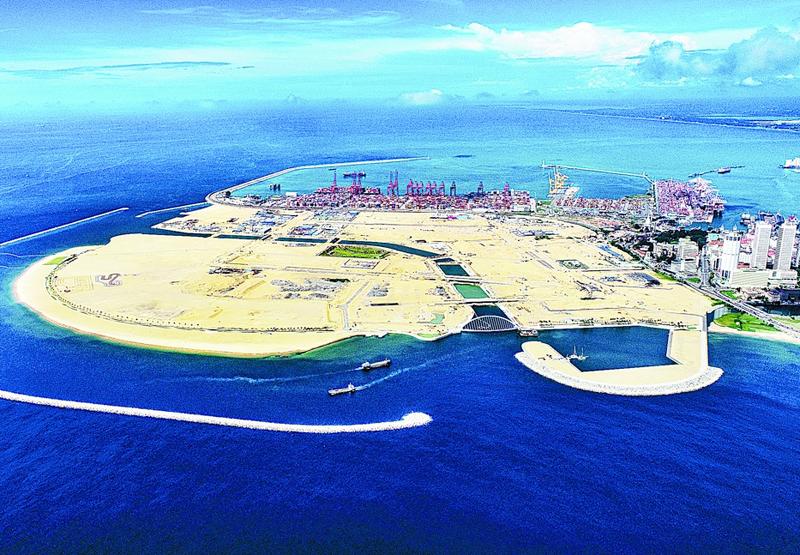 This undated photo displays a panoramic view of Colombo Port City in Sri Lanka. (PHOTO / XINHUA)
This undated photo displays a panoramic view of Colombo Port City in Sri Lanka. (PHOTO / XINHUA)
Projects carried out under the China-proposed Belt and Road Initiative have boosted Sri Lanka's economic development, with their success putting paid to false claims that the assistance is trapping countries in high debt, analysts said.
Contrary to the narrative peddled by Beijing's critics of a so-called debt trap, China's help has become a driver for the long-term economic growth of countries that are participating in the BRI, the analysts said. In Sri Lanka, the Colombo Port City and Hambantota Port projects, as well as the construction of the Southern Expressway, are among the major undertakings associated with the infrastructure-boosting program.
The Colombo Port was placed 22nd in a global ranking of ports this year. It posted 6 percent growth in the volume of cargo handled, to a record 7.25 million twenty-foot-equivalent units in 2021, media cited the Sri Lanka Ports Authority as saying on Monday
The Colombo Port was placed 22nd in a global ranking of ports this year. It posted 6 percent growth in the volume of cargo handled, to a record 7.25 million twenty-foot-equivalent units in 2021, media cited the Sri Lanka Ports Authority as saying on Monday.
The ports authority's chief, Prasantha Jayamanna, told the Daily FT, a Sri Lankan newspaper, that the increased activity was encouraging, and that President Gotabaya Rajapaksa has said he wants the port to enter the top 15 in the global rankings by 2025.
Colombo Port City is envisaged as a premier residential, retail and business destination in South Asia, with China Harbour Engineering Company carrying out works, including for an artificial island.
"This reclaimed land gives Sri Lanka a chance to redraw the map and to build a city of world-class proportions and functionality and compete with Dubai or Singapore," Saliya Wickramasuriya, a member of the Colombo Port City Economic Commission, told the media.
ALSO READ: China-Sri Lanka friendship based on ancient roots
Major advantage
As for the Hambantota Port, its proximity to major sea lanes means it is a major advantage for the project.
Sri Lankan Prime Minister Mahinda Rajapaksa has thanked China "for its long-term and enormous support for the country's economic and social development".
With the country seeking to recover from the effects of the pandemic, critics of China have once again claimed Sri Lanka is being saddled with costly loans, with some calling the Chinese-assisted projects white elephants.
Sirimal Abeyratne, an economics professor at the University of Colombo, told China Daily that Sri Lanka opened its bond market to foreign investment in 2007, and about the same time started commercial borrowings, "which have nothing to do with Chinese loans".
China accounted for 10 percent of the island nation's $35 billion in foreign debt in April 2021, according to data from Sri Lanka's Department of External Resources, with Japan also accounting for about 10 percent. China is Sri Lanka's fourth-biggest lender, behind international financial markets, the Asian Development Bank and Japan.
The fact that China has been singled out in the critics' debt-trap narrative shows the extent to which they are trying to discredit China and BRI projects in the Asia-Pacific region, said Wang Peng, a researcher at the Center for American Studies with Zhejiang International Studies University.
READ MORE: China, Sri Lanka promise to enhance bilateral relations
According to the World Bank and the International Monetary Fund, a nation goes beyond the danger mark if its external debt exceeds 40 percent of gross domestic product.
"Sri Lanka's ability to develop as a regional logistics and a shipping hub to reap BRI benefits was very much highlighted," Samitha Hettige, an adviser to the National Education Commission of Sri Lanka, wrote in a commentary in Ceylon Today.
Xinhua contributed to this story.
Arunava Das is a freelance journalist for China Daily.
Contact the writers at vivien@chinadailyapac.com










